NKP 2-8-4 #765: Excursions, Specs, Photos
Last revised: October 16, 2024
By: Adam Burns
The Nickel Plate Road 765 is one
of the more well known large steam locomotives in the country due to its
long operating service hauling excursions since the late summer of
1979.
Over the years the 2-8-4 Berkshire has been operated all across the Midwest and eastern United States. Following a 12-year period and 4-year rebuild NKP 765 returned to operation in the fall of 2005.
Today, the steam locomotive, owned and operated by the Fort Wayne Railway Historical Society, finds itself used in a variety of showcased events and trips such as photo ops and other specials (including Santa Trains during the Christmas season).
One of the most celebrated recent showings of the 765 was when she teamed up and double-headed with Pere Marquette 1225 for TrainFestival 2009.
Additionally, the Norfolk Southern's jaunts with #765 through Pennsylvania and around legendary Horseshoe Curve for the Class I's steam program in 2012 and 2013 are also fondly remembered. The big Berkshire was able to stretch her legs and run wide open on a main line rails.
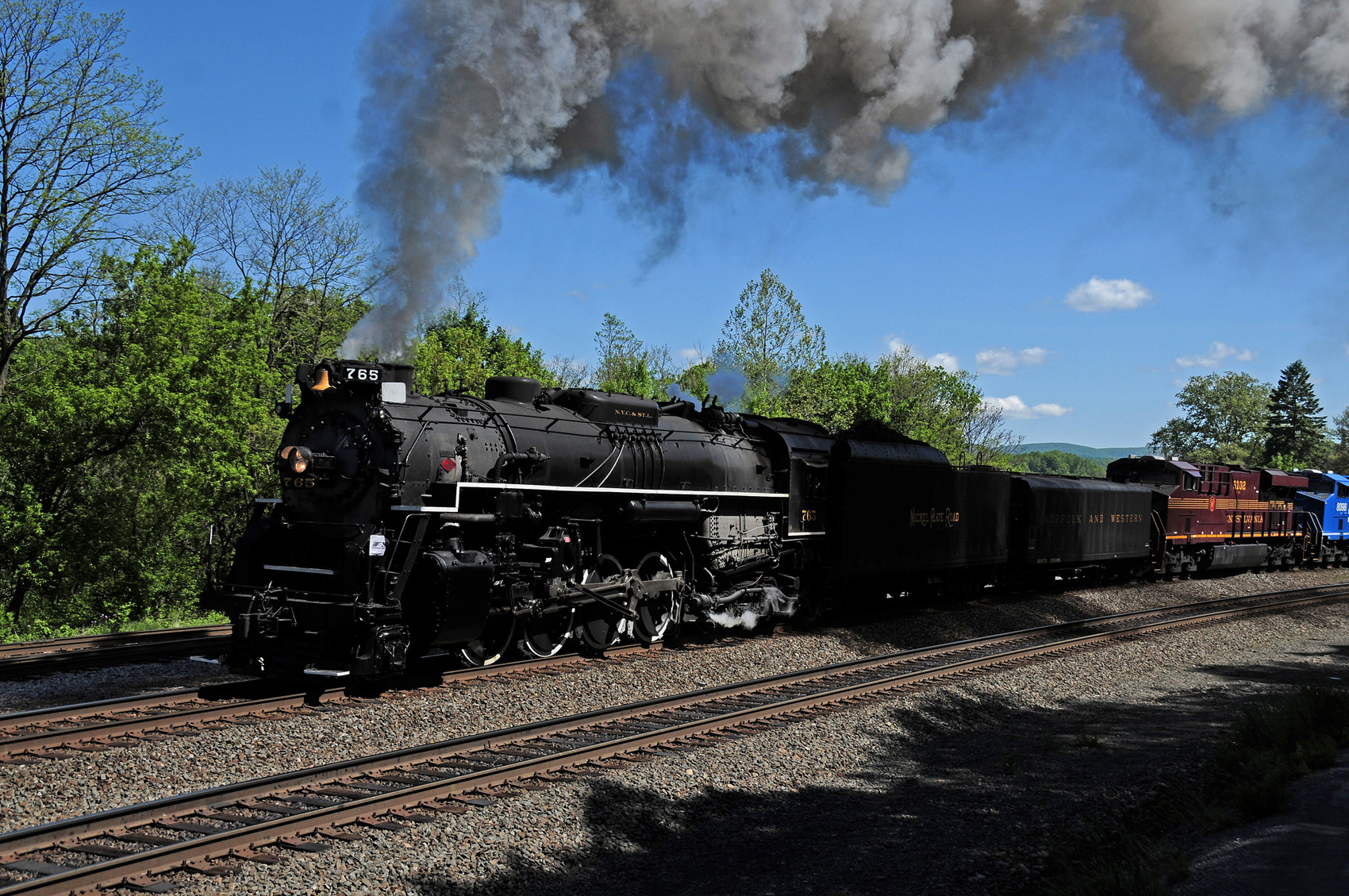 Nickel Plate Road 2-8-4 #765 during her excursions over the Norfolk Southern in Pennsylvania during the spring of 2013. Drew Jacksich photo.
Nickel Plate Road 2-8-4 #765 during her excursions over the Norfolk Southern in Pennsylvania during the spring of 2013. Drew Jacksich photo.The Berkshire locomotives of the 2-8-4 arrangement were perhaps one of the most beautiful steam designs ever built for medium-heavy duty. Of course, not only were these locomotives aesthetically pleasing, they could lug a heavy freight train as well!
While the locomotive class was very successful and purchased by a number of different railroads when it debuted in the 1920s, it is best remembered for its work on the little Boston & Albany Railroad where it also received its name when the model was being tested in the Berkshire Mountains of New England.
The Berkshire locomotive came about because of the hope of the Lima Locomotive Works, an established and well-known manufacturer of steam locomotives, to improve the USRA Mikado design (2-8-2), which lacked sufficient speed and horsepower.
Based initially from a New York Central Railroad H-7 Mikado design, what Lima ultimately came up with was a locomotive that included a larger, 100 square foot firebox that necessitated the need for an extra trailing axle giving the locomotive (designated a Class A-1) a 2-8-4 wheel arrangement.
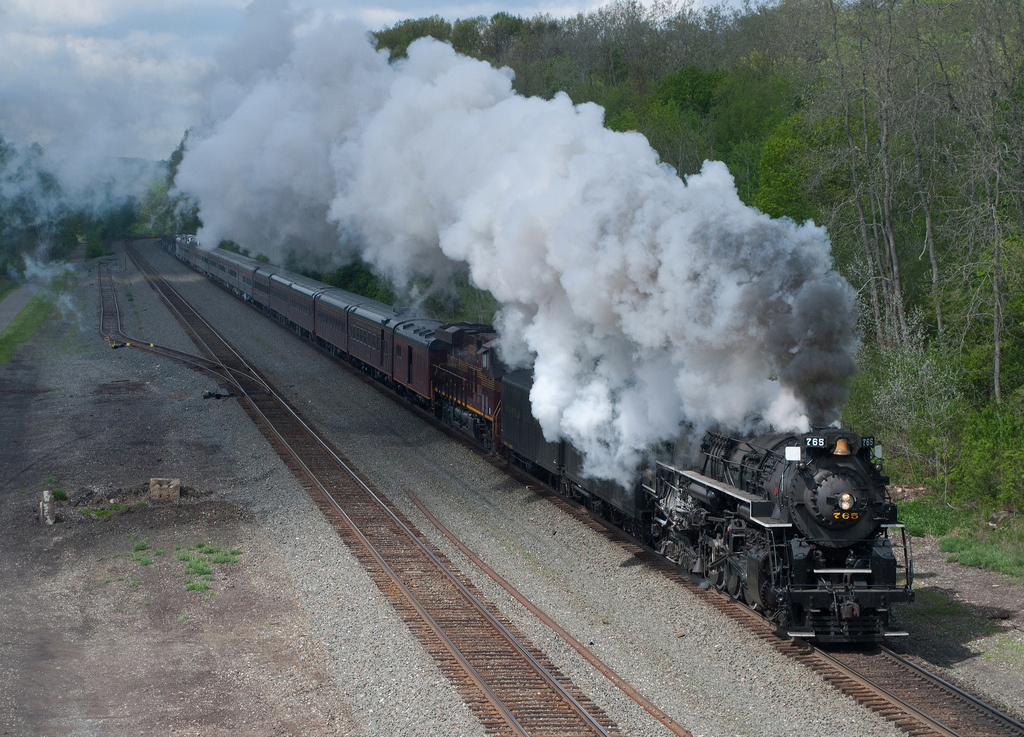 Nickel Plate Road #765 steams through Leetonia, Ohio with Norfolk Southern's Employees Special on May 12, 2013. Tom Granville photo.
Nickel Plate Road #765 steams through Leetonia, Ohio with Norfolk Southern's Employees Special on May 12, 2013. Tom Granville photo.Schedule (2025)
Check out the Indiana Rail Experience for more information regarding where and when you can find #765 operating in 2025.
The New York, Chicago & St. Louis (the Nickel Plate Road) quickly took a liking to these powerful and aesthetically pleasing locomotives. Between 1934 and 1949 the Nickel Plate took delivery of some 80 2-8-4s, all built locally by the Lima Locomotive Works.
Nickel Plate Road #765 was part of the railroad's S-2 class and was assigned to hauling main line freight trains around Bellevue, Ohio (the Berks became the railroad's flagship locomotives hauling virtually all of its high priority freight and passenger trains).
Overall the Nickel Plate's Berkshires could produce just over 64,000 pounds of tractive effort, 245 psi of boiler pressure, and held a top speed of around 70 mph. Being one of the most technologically advanced steam locomotives built during the late 1930s and through the early/mid-1940s the Berkshire saw a relatively short service life on most railroads, including the NYC&StL.
Nickel Plate Road 765 remained in regular service for only about 15 years before she was retired in June, 1958 (as you may note in the chart below, the railroad's S-3 Class of 2-8-4s saw less than 10 years of service!).
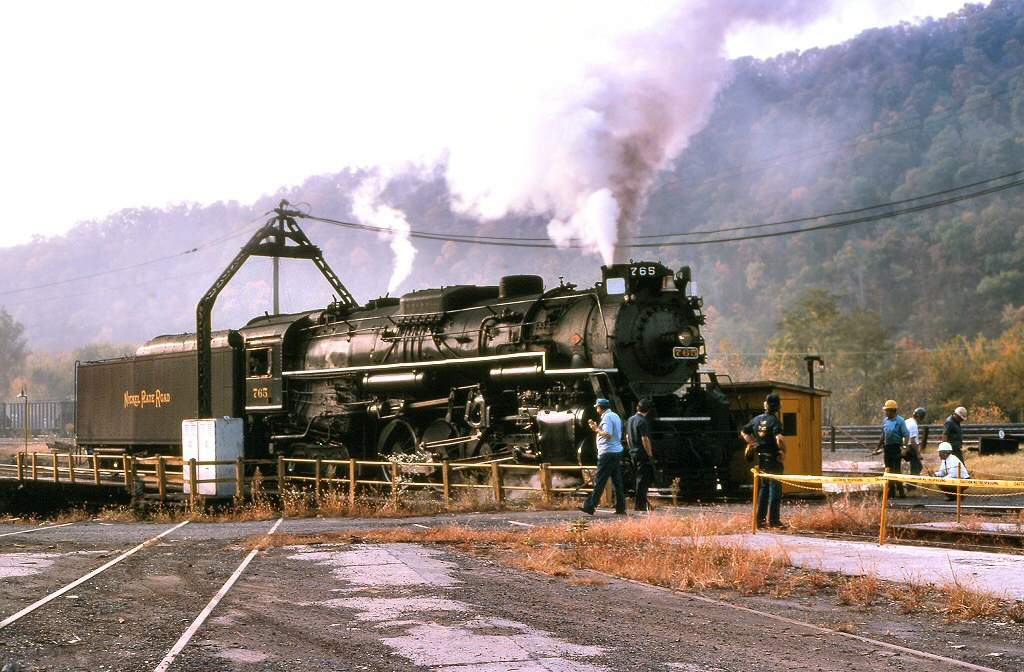 In this scene of the big Berkshire the locomotive takes a spin on the turntable at Hinton, West Virginia during October of 1983 to head back towards Huntington. Today, the yard is gone. Rob Kitchen photo.
In this scene of the big Berkshire the locomotive takes a spin on the turntable at Hinton, West Virginia during October of 1983 to head back towards Huntington. Today, the yard is gone. Rob Kitchen photo.NKP 765 survived the fate of most of her sisters and other steam locomotives when the railroad, as a gesture of good will, asked if the city of Fort Wayne would like one of its 2-8-4s to be preserved on static display.
The city accepted the offer but received the 765 instead of sister 767 as it had requested. Efforts to return NKP 765 back to operational status began in October, 1975 after the Fort Wayne Railroad Historical Society had been formed in 1972 to restore the locomotive.
After about four years of work Nickel Plate 765 returned to steam on the first day of September, 1979. Between that time and 1993 she logged over 52,000 miles of excursion service in more than half of states east of the Mississippi River.
Her most celebrated jaunts during these years was likely pulling the New River Train hosted by the Collis P. Huntington Chapter of the NRHS along the New River in West Virginia during the fall seasons of 1986 and 1993 (it was not long after this time that CSX disallowed steam locomotives to be operated on its railroad citing rising insurance costs).
Whistle
The locomotive's original whistle, as delivered from Lima, was a Nathan 5-chime variant, featuring brass on the bowl and bottom with cast iron on the top. It was a departure from the original S class of 1934 that featured all brass, constructed during a time before the world was at war and brass in short supply.
The original whistle is preserved but no longer in use; it was damaged during a blowing session during the late 1960's/early 1970's and is missing an internal valve. Today, #765's whistle of choice is an all-brass variant from sister #700. The locomotive has also operated with a number of guest whistles over the years.
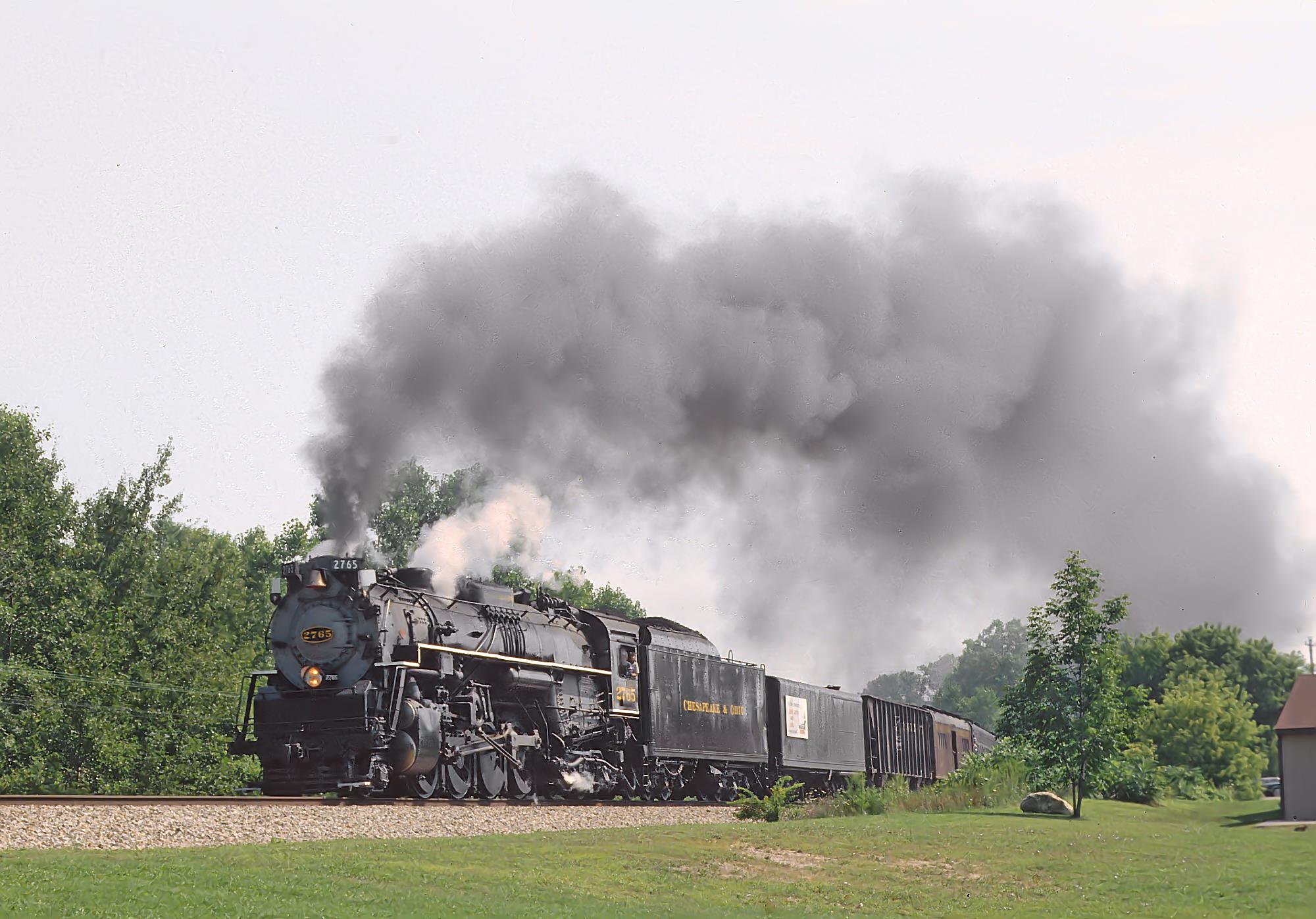 "Chesapeake & Ohio" 2-8-4 #2765 leads an excursion over CSX near Sunfield, Michigan in August 1993. In reality, this engine was actually Nickel Plate Road #765 dressed as a C&O “Kanawha.” Rick Burn photo.
"Chesapeake & Ohio" 2-8-4 #2765 leads an excursion over CSX near Sunfield, Michigan in August 1993. In reality, this engine was actually Nickel Plate Road #765 dressed as a C&O “Kanawha.” Rick Burn photo.After her 1993 operating season NKP 765 was shopped for a general overhaul of her running gear although her owners instead decided to give her a full rebuild.
This effort took much longer than expected, mostly because of the astronomical cost involved in carrying out the rebuild. It took the Fort Wayne Railroad Historical Society eight years to raise the money needed for her rebuild, which began in 2001 and was completed by October, 2005 when she officially returned to steam.
With fewer states to now operate in due to CSX's policy NKP 765 has nevertheless remained successful hauling various excursions and participating in other events, where she continues to draw large crowds.
Nickel Plate Road's 2-8-4 Berkshires
| Class | Road Numbers | Date Built | Builder | Quantity |
|---|---|---|---|---|
| S | 700-714 | 1934 | Lima | 15 |
| S-1 | 715-739 | 1942 | Lima | 25 |
| S-2 | 740-769 | 1944 | Lima | 30 |
| S-3 | 770-779 | 1949 | Lima | 10 |
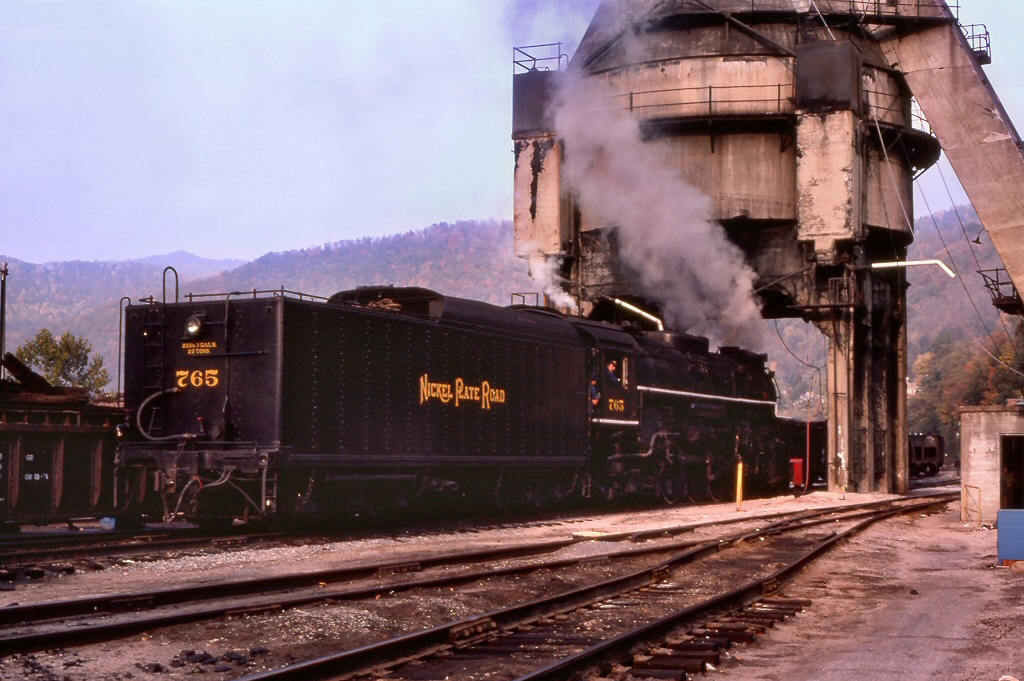 Another view at Hinton as the Berkshire passes under the old coaling tower, which is the only visible reminder today that a yard was ever located here. Rob Kitchen photo.
Another view at Hinton as the Berkshire passes under the old coaling tower, which is the only visible reminder today that a yard was ever located here. Rob Kitchen photo.If you would like to NKP 765 in operation please visit the Fort Wayne Railroad Historical Society's website to learn when her next scheduled excursion will be.
For more reading about the Nickel Plate's fleet of Berkshires a good book on the subject is, "Berkshires Of The Nickel Plate Road," by author Kevin Holland.
The title explores the road's entire fleet of 80 Class S 2-8-4s from the time they were delivered until retirement and disposition of those units which were preserved for posterity, such as #765. The book is 124 pages and features more than 150 pictures.
Recent Articles
-
Brightline Unveils ‘Freedom Express’ To Commemorate America’s 250th
Feb 20, 26 11:36 AM
Brightline, the privately operated passenger railroad based in Florida, this week unveiled its new Freedom Express train to honor the nation's 250th anniversary. -
Age of Steam Roundhouse Adds C&O No. 1308
Feb 20, 26 10:53 AM
In late September 2025, the Age of Steam Roundhouse Museum in Sugarcreek, Ohio, announced it had acquired Chesapeake & Ohio 2-6-6-2 No. 1308. -
Reading & Northern Announces 2026 Excursions
Feb 20, 26 10:08 AM
Immediately upon the conclusion of another record-breaking year of ridership in 2025, the Reading & Northern Passenger Department has already begun its 2026 schedule of all-day rail excursion. -
Siemens Mobility Tapped To Modernize Tri-Rail Fleet
Feb 20, 26 09:47 AM
South Florida’s Tri-Rail commuter service is preparing for a significant motive-power upgrade after the South Florida Regional Transportation Authority (SFRTA) announced it has selected Siemens Mobili… -
Reading T-1 No. 2100 Restoration Progress
Feb 20, 26 09:36 AM
One of the most famous survivors of Reading Company’s big, fast freight-era steam—4-8-4 T-1 No. 2100—is inching closer to an operating debut after a restoration that has stretched across a decade and… -
C&O Kanawha No. 2716: A Third Chance at Steam
Feb 20, 26 09:32 AM
In the world of large, mainline-capable steam locomotives, it’s rare for any one engine to earn a third operational career. Yet that is exactly the goal for Chesapeake & Ohio 2-8-4 No. 2716. -
Missouri Wine Tasting Train Rides
Feb 20, 26 09:29 AM
The fusion of scenic vistas, historical charm, and exquisite wines is beautifully encapsulated in Missouri's wine tasting train experiences. -
Minnesota Wine Tasting Train Rides
Feb 20, 26 09:26 AM
This article takes you on a journey through Minnesota's wine tasting trains, offering a unique perspective on this novel adventure. -
Kansas Murder Mystery Dinner Train Rides
Feb 20, 26 09:23 AM
Kansas, known for its sprawling wheat fields and rich history, hides a unique gem that promises both intrigue and culinary delight—murder mystery dinner trains. -
Florida Murder Mystery Dinner Train Rides
Feb 20, 26 09:20 AM
Florida, known for its vibrant culture, dazzling beaches, and thrilling theme parks, also offers a unique blend of mystery and fine dining aboard its murder mystery dinner trains. -
NC&StL “Dixie” No. 576 Nears Steam Again
Feb 20, 26 09:15 AM
One of the South’s most famous surviving mainline steam locomotives is edging closer to doing what it hasn’t done since the early 1950s, operate under its own power. -
Frisco 2-10-0 No. 1630 Continues Overhaul
Feb 19, 26 03:58 PM
In late April 2025, the Illinois Railway Museum (IRM) made a difficult but safety-minded call: sideline its famed St. Louis–San Francisco Railway (Frisco) 2-10-0 No. 1630. -
PennDOT Pushes Forward Scranton–New York Passenger Rail Plan
Feb 19, 26 12:14 PM
Pennsylvania’s long-discussed idea of restoring passenger trains between Scranton and New York City is moving into a more formal planning phase. -
CSX Advances Locomotive Technology to Cut Fuel Use and Emissions
Feb 19, 26 09:43 AM
CSX recently highlighted major progress on its ongoing efforts to reduce fuel consumption, cut greenhouse-gas emissions, and improve operational efficiency across its freight rail network through adva… -
Ohio Railway Museum Unveils “Vision for the Future” Plan
Feb 19, 26 09:39 AM
The Ohio Railway Museum (ORM), one of the nation’s oldest all-volunteer rail preservation organizations, has laid out an ambitious blueprint aimed at transforming its organization. -
B&O Railroad Museum Unveils $38M Expansion
Feb 19, 26 09:24 AM
Western Maryland Railway F7 236 points towards the Mount Clare Roundhouse in Baltimore as part of the B&O Museum. -
Cuyahoga Valley Scenic To Repower Two FPA4s
Feb 19, 26 09:21 AM
A pair of classic, streamlined Alco/MLW FPA4 locomotives that have become signature power on the Cuyahoga Valley Scenic Railroad (CVSR) are slated for a major mechanical transformation. -
Ohio's Dinner Train Rides At The CVSR
Feb 19, 26 09:18 AM
While the railroad is well known for daytime sightseeing and seasonal events, one of its most memorable offerings is its evening dining program—an experience that blends vintage passenger-car ambience… -
Indiana Dinner Train Rides In Jasper
Feb 19, 26 09:16 AM
In the rolling hills of southern Indiana, the Spirit of Jasper offers one of those rare attractions that feels equal parts throwback and treat-yourself night out: a classic excursion train paired with… -
New Hampshire Murder Mystery Dinner Train Rides
Feb 19, 26 09:12 AM
The state's murder mystery trains stand out as a captivating blend of theatrical drama, exquisite dining, and scenic rail travel. -
New York Murder Mystery Dinner Train Rides
Feb 19, 26 09:07 AM
New York State, renowned for its vibrant cities and verdant countryside, offers a plethora of activities for locals and tourists alike, including murder mystery train rides! -
UP, NS Set April 30 Date To Refile Merger Application
Feb 18, 26 04:36 PM
Union Pacific and Norfolk Southern have told federal regulators they will submit a revised merger application on April 30, restarting the formal review process for what would become one of the most co… -
CTDOT May Swap Shore Line East’s Electrics For Diesels
Feb 18, 26 04:20 PM
Connecticut’s Shore Line East (SLE) commuter rail service—one of the state’s most scenic and strategically important passenger corridors—could soon see a major operational change. -
NPS Awards $1.93M To Sioux City Railroad Museum
Feb 18, 26 01:21 PM
The Sioux City Railroad Museum has received a $1.93 million National Park Service grant aimed at pushing the museum’s long recovery from the June 2024 flooding. -
$1.3M Mott Foundation Grant To Help Rebuild Rio Grande 2-8-2 No. 464
Feb 18, 26 09:43 AM
A $1.3 million grant from the Charles Stewart Mott Foundation will fund critical work on steam locomotive No. 464, the railroad’s 1903-built 2-8-2 “Mikado” that has been out of service awaiting heavy… -
NS Unveils Third “Landmark Series” Locomotive
Feb 18, 26 09:38 AM
Norfolk Southern has officially introduced ES44AC No. 8184, the third locomotive in its new “Landmark Series,” a program that spotlights the historic rail cities and communities that helped shape both… -
WMSR's Georges Creek Division: Reviving A Long-Dormant Line
Feb 18, 26 09:34 AM
In 2024 the WMSR announced it was rebuilding part of the old WM. The Georges Creek Division will provide both heritage passenger service and future freight potential in a region once defined by coal… -
Chesapeake & Ohio 614 Restoration Pushes Forward
Feb 18, 26 09:32 AM
One of the most recognizable mainline steam locomotives to survive the post–steam era, C&O 614, is steadily moving through an intensive return-to-service overhaul. -
Montana Dinner Train Rides Near Lewistown
Feb 18, 26 09:30 AM
The Charlie Russell Chew Choo turns an ordinary rail trip into an evening event: scenery, storytelling, live entertainment, and a hearty dinner served as the train rumbles across trestles and into a t… -
Wisconsin Dinner Train Rides In North Freedom
Feb 18, 26 09:18 AM
Featured here is a practical guide to Mid-Continent’s dining train concept—what the experience is like, the kinds of menus the museum has offered, and what to expect when you book. -
Pennsylvania Murder Mystery Dinner Train Rides
Feb 18, 26 09:09 AM
Pennsylvania, steeped in history and industrial heritage, offers a prime setting for a unique blend of dining and drama: the murder mystery dinner train ride. -
New Jersey Murder Mystery Dinner Train Rides
Feb 18, 26 09:06 AM
There are currently no murder mystery dinner trains available in New Jersey although until 2023 the Cape May Seashore Lines offered this event. Perhaps they will again soon! -
Huckleberry Railroad: Riding Narrow-Gauge Steam In Michigan!
Feb 18, 26 09:03 AM
The Huckleberry Railroad is a tourist attraction that is part of the Crossroads Village & Huckleberry Railroad Park located in Flint, Michigan featuring several operating steam locomotives. -
New York & Lake Erie Unveils M636 No. 636 In New Colors (2025)
Feb 17, 26 02:05 PM
In mid-May 2025, railfans along the former Erie rails in Western New York were treated to a sight that feels increasingly rare in North American railroading: a big M636 in new paint. -
First Siemens “Northlander” Trainset Arrives In Ontario
Feb 17, 26 11:46 AM
Ontario’s long-awaited return of the Northlander passenger train took a major step forward this winter with the arrival of the first brand-new Siemens-built trainset in the province. -
Sound Transit Set to Launch Cross-Lake Service
Feb 17, 26 10:09 AM
For the first time in the region’s modern transit era, Sound Transit light rail trains will soon carry passengers directly across Lake Washington -
Michigan’s Old Road Dinner Train Still Seeks New Home
Feb 17, 26 10:04 AM
In May, 2025 it was announced that Michigan's Old Road Dinner Train was seeking a new home to continue operations. As of this writing that search continues. -
WMSR Acquires Conemaugh & Black Lick SW7 No. 111
Feb 17, 26 10:00 AM
In a notable late-summer preservation move, the Western Maryland Scenic Railroad (WMSR) announced in August 2025 that it had acquired former Conemaugh & Black Lick Railroad (C&BL) EMD SW7 No. 111. -
MBTA Unveils New Haven-Inspired Locomotive
Feb 17, 26 09:58 AM
he Massachusetts Bay Transportation Authority has pulled back the curtain on its newest heritage locomotive, F40PH-3C No. 1071, wearing a bold, New Haven–inspired paint scheme that pays tribute to the… -
Missouri Dinner Train Rides In Branson
Feb 17, 26 09:53 AM
Nestled in the heart of the Ozarks, the Branson Scenic Railway offers one of the most distinctive rail experiences in the Midwest—pairing classic passenger railroading with sweeping mountain scenery a… -
Texas Murder Mystery Dinner Train Rides
Feb 17, 26 09:49 AM
Here’s a comprehensive look into the world of murder mystery dinner trains in Texas. -
Connecticut Murder Mystery Dinner Train Rides
Feb 17, 26 09:48 AM
All aboard the intrigue express! One location in Connecticut typically offers a unique and thrilling experience for both locals and visitors alike, murder mystery trains. -
RTA To Become The Northern Illinois Transit Authority
Feb 16, 26 12:49 PM
Later this year, the Regional Transportation Authority (RTA)—the umbrella agency that plans and funds public transportation across the Chicago region—will be reorganized into a new entity: the Norther… -
CPKC Holiday Train Sets New Record In 2025
Feb 16, 26 11:06 AM
Canadian Pacific Kansas City’s (CPKC) beloved Holiday Train wrapped up its 2025 tour with a milestone that underscores just how powerful a community tradition can become. -
Historic Izaak Walton Inn Slated To Close
Feb 16, 26 10:51 AM
A storied rail-side landmark in northwest Montana—the Izaak Walton Inn in Essex—appears headed for an abrupt shutdown, with employees reportedly told their work will end “on or about March 6, 2026.” -
B&O Railroad Museum Unveils Restored American Freedom Train No. 1
Feb 16, 26 10:31 AM
The B&O Railroad Museum has completed a comprehensive cosmetic restoration of American Freedom Train No. 1, the patriotic 4-8-4 steam locomotive that helped pull the famed American Freedom Train durin… -
Union Pacific, Wabtec Ink $1.2B Deal To Modernize AC4400 Fleet
Feb 16, 26 10:25 AM
Union Pacific has signed a $1.2 billion agreement with Wabtec to modernize a significant portion of its GE AC4400 fleet, doubling down on the strategy of rebuilding proven high-horsepower road units r… -
CSX Taps Wabtec For $670M Locomotive And Digital Upgrade
Feb 16, 26 10:19 AM
CSX Transportation says it is moving to refresh and standardize a major piece of its operating fleet, announcing a $670 million agreement with Wabtec. -
New Mexico "Dinner" Train Rides
Feb 16, 26 10:15 AM
If your heart is set on clinking glasses while the desert glows at sunset, you can absolutely do that here—just know which operator offers what, and plan accordingly. -
West Virginia's Dinner Train Rides In Elkins
Feb 16, 26 10:13 AM
The D&GV offers the kind of rail experience that feels purpose-built for railfans and casual travelers.


















































